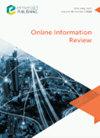Open science policies as regarded by the communities of researchers from the basic sciences in the scientific periphery
IF 3.1
3区 管理学
Q2 COMPUTER SCIENCE, INFORMATION SYSTEMS
引用次数: 0
Abstract
PurposeThis paper explores the different open science policy effects on the knowledge generation process of researchers in basic sciences: biology, chemistry and physics.Design/methodology/approachThis paper uses a qualitative methodology with a content analysis approach. It uses seventeen semi-directed interviews.FindingsThe main perceived effect of open science is access to research inputs, with open access, open research data and code reuse as primary sources. Another issue is the increase of collaboration with other colleagues in terms of the ability to collaborate faster and encouraging the exchange of ideas. However, this benefit does not translate to the division of labor in large transnational teams. Time spent on tasks like cleaning up data and code, scooping and other ethical issues are unfavorable aspects noted.Practical implicationsPolicymakers could use this study to enhance current open science policies in the countries.Originality/valueThis study analyzes the perspectives of basic sciences researchers from two countries about open science policies. The main conclusion is the fact that open science policies should focus on the research process itself – rather than research outputs – in order to effectively tackle inequalities in science.Peer reviewThe peer review history for this article is available at: https://publons.com/publon/10.1108/OIR-03-2023-0135科学边缘地区基础科学研究人员群体对开放科学政策的看法
目的本文探讨了开放科学政策对基础科学(生物学、化学和物理学)研究人员知识创造过程的不同影响。研究结果人们认为开放科学的主要影响是获得研究投入,主要来源是开放存取、开放研究数据和代码重用。另一个问题是增加了与其他同事的合作,从而能够更快地开展合作,并鼓励思想交流。然而,这种好处并没有转化为大型跨国团队的分工。本研究分析了两个国家的基础科学研究人员对开放科学政策的看法。主要结论是,开放科学政策应关注研究过程本身--而不是研究成果--以有效解决科学领域的不平等问题。同行评审本文的同行评审历史见:https://publons.com/publon/10.1108/OIR-03-2023-0135。
本文章由计算机程序翻译,如有差异,请以英文原文为准。
求助全文
约1分钟内获得全文
求助全文
来源期刊

Online Information Review
工程技术-计算机:信息系统
CiteScore
6.90
自引率
16.10%
发文量
67
审稿时长
6 months
期刊介绍:
The journal provides a multi-disciplinary forum for scholars from a range of fields, including information studies/iSchools, data studies, internet studies, media and communication studies and information systems.
Publishes research on the social, political and ethical aspects of emergent digital information practices and platforms, and welcomes submissions that draw upon critical and socio-technical perspectives in order to address these developments.
Welcomes empirical, conceptual and methodological contributions on any topics relevant to the broad field of digital information and communication, however we are particularly interested in receiving submissions that address emerging issues around the below topics.
Coverage includes (but is not limited to):
•Online communities, social networking and social media, including online political communication; crowdsourcing; positive computing and wellbeing.
•The social drivers and implications of emerging data practices, including open data; big data; data journeys and flows; and research data management.
•Digital transformations including organisations’ use of information technologies (e.g. Internet of Things and digitisation of user experience) to improve economic and social welfare, health and wellbeing, and protect the environment.
•Developments in digital scholarship and the production and use of scholarly content.
•Online and digital research methods, including their ethical aspects.
 求助内容:
求助内容: 应助结果提醒方式:
应助结果提醒方式:


